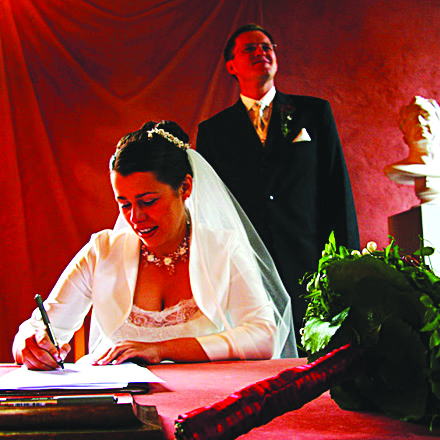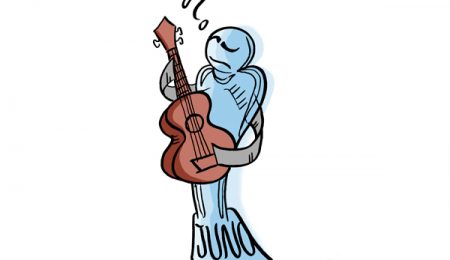Photo by Benjamin Rennicke
A couple of weeks ago, University of Ottawa student Véronique Laliberté made the news with her thesis proposal that offers an alternative to the traditional model of marriage. By proposing to study the subject of fixed-term marriages for her master’s thesis, Laliberté is promoting the idea that marriage could be improved by treating it more like a work contract. For example, if a couple agreed to be married for five years under this model, their marriage would automatically dissolve after this period of time and their union could only be maintained if they chose to renew their contract. So, is this a practical alternative to “till death do us part,” or is this fixed-term model an insult to the very idea of marriage?
Fixed-term marriages miss the point
We’re lucky in Canada. People of all ages, races, and sexual orientations are married civilly and religiously every day, while others decide to wait or forego marriage entirely. For the most part we think nothing of it, because our mantra is relatively simple: “As long as they’re happy.”
In a country with such liberal views on marriages why not allow fixed-term marriages? Véronique Laliberté has suggested that it essentially boils down to a question of happiness. “It’s not for better or for worse, it’s for better,” she said in a recent interview with the Fulcrum.
Laliberté is right about one thing. The concerned couples’ happiness and well-being should be our main consideration when debating marital laws. She just happens to be wrong about the long-term impact that fixed-term marriages will have on married couples.
First of all, unlike the legal recognition of common-law marriage—and same-sex marriage more recently—the non-existence of fixed-term marriages does not hinder anyone’s freedom. A couple that wants to split up or get divorced after a period of five years is still free to do so. They can even plan it ahead of time for all we care. Therefore, it’s hard to see the necessity of implementing a fixed-term model.
Secondly, it may not be immediately evident, but fixed-term marriages would only serve to make couples less happy in the long term. Although I admit that hypothetical levels of happiness do not form the basis of many good arguments, I nevertheless feel they should be taken into consideration here.
The truth is that fixed-term marriages would have a profound impact on the level of trust between spouses and partners. Every time the end of the marriage term approached, couples would be forced to re-evaluate their situation and decide whether they were having enough fun, or if their sex life was still satisfactory. Divorce rates may go down, but “dissolution rates” as they would be called, would skyrocket into their place.
In today’s world that is constantly in pursuit of the next best thing, the ideal “good” is always just short of being good enough. It is not contentment, but true happiness we seek. “I have a partner who genuinely cares for me, who is faithful, and in whom I can trust,” one might think. “But am I really happy?”
“Oftentimes, people think that things should come easy and so if it’s hard maybe it’s not meant to be,” said local Ottawa therapist Judy Kiar in an article for Metro News. “But the reality is, there’s something to be said for working at something and seeing it evolve into something better, rather than just having a change-partners mentality.”
In the end, Laliberté’s proposal is but a quick-fix solution to a more fundamental problem, and one that risks doing more harm than good.
—Justin Dallaire
Practicality trumps tradition
Marriage is one of the oddest facets of our modern culture. There is so much weight placed on a couple of little rings that are supposed to signify this eternal unbreakable bond between lovers. Seems pretty solid, right? Well, not quite.
The widely held understanding in North America is that roughly 40 to 50 per cent of marriages end in divorce. We live in a world where it’s about as likely for you to call a coin toss correctly as it is to have a successful marriage.
Furthermore, our society no longer encourages people to stay in unfulfilling unions just for the sake of the commitment. The 1950s model of the husband rolling home in his new Chevy to be greeted by his adoring homemaker wife is undoubtedly antiquated.
The fabric of the early stage of our adult life is also being stretched with every passing year. More and more people are getting educated instead of jumping right into the workforce to support a family. The hasty decisions of generations past saw many people getting hitched at 18 or 19 years old, way before they could have grasped the complexities of what makes a mature relationship work.
Marriages are big decisions, so why not treat them like any other big decision in life. Why buy the sports car, when you can just rent one for a while and see how you like it?
Véronique Laliberté has been studying an idea that may solve the issues people face when they decide to get married. She proposed the idea that marriage could be more like a work contract, where you can decide at the end of a fixed term if you want to renew it or not. If everything is going well and you’re happy, just re-up. However, if things are falling apart, just end your contract amicably and move on with your life.
Some may say this is a needlessly cold way to go about a relationship with the person you love, but it might just make more sense than the traditional way of thinking that encourages two people to be trapped in an unhappy union forever.
This new fixed-term marriage model is almost like renewing your vows, but in a way that is a little more financially sound.
It could be particularly beneficial to career-driven individuals, who are often scrutinized for not wanting to settle down, maybe because they are primarily committed to their work. Of course they could always choose not to get married, but if they felt compelled to tie the knot, a fixed-term marriage system would offer them the security and flexibility that traditional marriage could never provide.
In this weird world of marriage and love, a shakeup is exactly what we need. If we want to see more happy couples and fewer unhappy or failed marriages, we might have to start looking towards a dotted line rather than a diamond ring.
—Spencer Murdock





